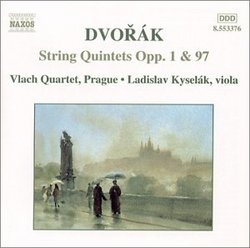Amazon.comThese two quintets make an interesting pair. Dvorák wrote Op. 1 when he was 20; the seeds of greatness to come are clearly discernible in its passionate romantic ardor and simple, lovely melodies. However, the piece tends to ramble, and he had yet to find his own distinctive voice. There are echoes of Mendelssohn, Schubert, and Schumann, and an almost direct quote from Mozart's G-minor Piano Quartet. The piece was premiered 17 years after Dvorák's death and published a century after his birth. The other quintet here, one of his consummate masterpieces, was written more than three decades later in Spillville, Iowa, an enclave of Czech immigrants where Dvorák spent summer holidays during his stay in America. Like all the composer's so-called American pieces, it seems to reflect homesickness rather than any New World influences. While the early quintet starts with a slow introduction, the opening here merely feels slower; hesitant and questioning, like a curtain drawn gradually to reveal a scene basking in mellow sunlight. The Scherzo is a lively dance with a lyrical Trio, the Finale is vigorous and exuberant. But the work's jewel is its slow movement, a set of inspired variations on a theme of incomparable, heart-melting beauty. The writing is masterly; as usual, Dvorák makes the violas, his own instrument, especially prominent. The playing is excellent. The Quartet, joined here by violist Kyselák Ladislav, is literally the inheritor of the great Czech tradition: Josef Vlach, leader of the famous Vlach Quartet, is the first violinist's father and mentor to the younger players. Dvorák's music is as natural to them as their native tongue. Tempi are sensible, rhythmic liberties poised, textures rich but transparent. The tone is warm, vibrant, and expressive. They prize spontaneity and immediacy of expression over perfection. --Edith Eisler


 Track Listings (7) - Disc #1
Track Listings (7) - Disc #1